
Toxicon-X
Scope & Guideline
Championing Open Access in Toxicological Research
Introduction
Aims and Scopes
- Toxin Characterization and Mechanism of Action:
Research focusing on the biochemical properties and biological effects of various toxins, including venoms from snakes and scorpions, as well as plant-derived toxins. This area aims to elucidate the mechanisms by which these toxins exert their effects on biological systems. - Antivenom Development and Efficacy:
Studies aimed at evaluating the effectiveness of existing antivenoms and exploring new methods for antivenom development, including the use of monoclonal antibodies and novel therapeutic approaches to neutralize venom effects. - Environmental and Ecological Impact Studies:
Research that examines the ecological factors influencing toxin production and the impact of environmental changes on toxin dynamics, particularly in relation to snake and marine envenomations. - Public Health and Community Engagement:
Investigations into the socio-cultural aspects of snakebite incidents, including healthcare access, community education, and strategies to enhance prevention and care for envenomation. - Toxicological Assessments and Alternatives to Traditional Methods:
Development of alternative testing methods for toxin assessment, such as in vitro assays, to reduce reliance on animal models in toxicity testing.
Trending and Emerging
- Innovative Therapeutic Approaches using Monoclonal Antibodies:
Recent publications have increasingly focused on the development and application of monoclonal antibodies for neutralizing toxins, particularly in snakebite treatment. This trend indicates a shift towards targeted therapies that could enhance treatment outcomes. - Integration of Environmental and Public Health Perspectives:
There is a growing emphasis on the intersection of environmental factors and public health in the context of toxin exposure and snakebite incidents. Research exploring how ecological changes affect toxin dynamics and envenomation rates is becoming more prominent. - Community Health Education and Engagement Strategies:
A notable increase in studies examining the effectiveness of community health education programs and engagement strategies to combat snakebite envenoming reflects a recognition of the importance of local involvement in health interventions. - Advanced Toxicological Testing Methods:
The trend towards using high-throughput screening and other innovative methodologies for assessing toxin effects and antivenom efficacy is gaining momentum, highlighting a shift towards more sophisticated and efficient research techniques. - Cross-Species and Cross-Context Comparisons:
Research comparing venom effects and envenomation outcomes across different species and geographical contexts is emerging as a significant theme, indicating a collaborative approach to understanding toxinology on a global scale.
Declining or Waning
- Traditional Animal Models in Toxicology:
There has been a noticeable decrease in studies relying on traditional animal models for toxicity assessments, as the focus shifts towards more ethical and effective in vitro alternatives. This trend indicates a growing recognition of the need for humane research practices. - General Venom Studies without Specific Applications:
Research that broadly characterizes venoms without a clear application to antivenom development or clinical relevance appears to be waning. The journal is moving towards more applied research that directly addresses public health issues related to envenomation. - Historical Reviews of Venomous Animals:
While reviews are important, there seems to be a reduced emphasis on historical accounts or general overviews of venomous species. The trend is shifting towards specific, data-driven studies that provide actionable insights into the management and treatment of envenomations.
Similar Journals

Forensic Toxicology
Decoding Toxicological Evidence for JusticeForensic Toxicology is a premier journal published by Springer, renowned for delivering cutting-edge research in the realms of toxicology, biochemistry, and forensic medicine. With an ISSN of 1860-8965 and an E-ISSN of 1860-8973, this journal has established itself as a significant resource for professionals, researchers, and students engaged in the analysis of toxic substances within a forensic context. Its impressive impact factor and ranking reveal its influential presence in the field, particularly as it is categorized in Q1 for Pathology and Forensic Medicine and Q2 for Biochemistry (Medical) and Toxicology. Featured articles span a wide array of topics, facilitating interdisciplinary collaboration and advancing scientific knowledge. While currently not an open-access journal, it remains accessible through institutional subscriptions. With a convergence span from 2006 to 2024, Forensic Toxicology is committed to publishing high-quality research that enhances the understanding of toxicological phenomena and their implications in forensic investigations, reinforcing its role as an indispensable resource in the scientific community.
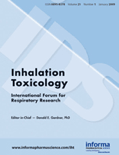
INHALATION TOXICOLOGY
Transforming Research into Real-World Solutions.Inhalation Toxicology, published by Taylor & Francis Ltd, is a premier journal dedicated to advancing the field of toxicology with a particular focus on inhalation exposure and its impact on human health. Established in 1989, this journal provides a vital platform for original research, reviews, and case studies that explore the toxicological effects of inhaled substances, making it essential reading for researchers, health professionals, and regulatory scientists. With an Impact Factor that situates it in the Q3 category in both Health, Toxicology and Mutagenesis, the journal asserts its relevance within the scientific community, particularly emphasizing its contributions as indexed by Scopus rankings in related fields. Although it follows a traditional access model, the journal's commitment to delivering high-quality research continues to foster significant discussions and advancements in understanding inhalation toxicology. For those at the forefront of environmental science and pharmacology, Inhalation Toxicology is an indispensable resource for both current research and future innovations in the discipline.

Toxicology Communications
Empowering insights into the effects of harmful agents.Toxicology Communications is a vital academic journal published by Taylor & Francis Ltd, focusing on the critical field of toxicology. Established as an Open Access journal since 2017, it provides researchers, professionals, and students unrestricted access to significant findings in toxicological sciences, promoting global collaboration and knowledge sharing. The journal aims to disseminate innovative research, reviews, and case studies that explore the effects of chemical, biological, and physical agents on human health and the environment. With its commitment to high-quality publications, Toxicology Communications plays an essential role in advancing our understanding of toxicological phenomena and fostering safe practices across various industries. This makes it an invaluable resource for anyone dedicated to the studies of toxins and their environmental and health implications.
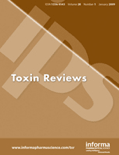
Toxin Reviews
Exploring the Complexities of ToxinsToxin Reviews is a premier academic journal focused on the critical field of Toxicology, published by Taylor & Francis Inc. Established with an aim to foster research and disseminate knowledge, this journal has been pivotal since its inception in 1982 and continues to be a leading platform for both emerging and established researchers. With an impressive impact factor and ranked in the 75th percentile among its peers in the Scopus categories, it serves as an essential resource for scientists, practitioners, and students interested in understanding the complexities of toxins and their effects on health. The journal provides an Open Access platform, enhancing visibility and accessibility of research findings to a broader audience. Covering a wide scope, Toxin Reviews plays a vital role in bridging gaps between toxicological research and practical applications, ensuring that rigorous scientific inquiry translates into real-world solutions.
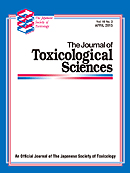
JOURNAL OF TOXICOLOGICAL SCIENCES
Leading the Charge in Toxicological DiscoveriesThe Journal of Toxicological Sciences, published by the Japanese Society of Toxicological Sciences, is a prominent academic journal dedicated to the comprehensive study of toxicology and its related fields. Since its inception in 1976, the journal has provided a vital platform for researchers and professionals to disseminate innovative findings and insights in toxicology, with a focus on both experimental and clinical studies. Positioned in the Q3 quartile across various relevant categories, including Medicine (miscellaneous) and Toxicology as of 2023, the journal plays an essential role in advancing our understanding of toxic substances and their effects on biological systems. Although currently not open access, the journal maintains high academic standards and is indexed in Scopus, ranking #96 in Toxicology. Offering unique perspectives from Japan, it encourages global collaboration and discourse among toxicologists, making it an invaluable resource for students, researchers, and industry professionals alike.
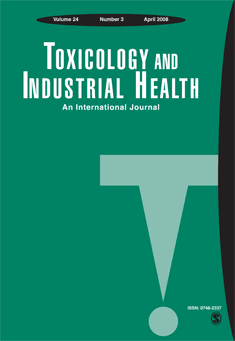
TOXICOLOGY AND INDUSTRIAL HEALTH
Bridging research and application to enhance environmental safety.TOXICOLOGY AND INDUSTRIAL HEALTH, published by SAGE PUBLICATIONS INC, is a premier journal in the field of toxicology, public health, and environmental health, with a significant history dating back to 1985. With its ISSN 0748-2337 and E-ISSN 1477-0393, the journal provides a platform for disseminating groundbreaking research and comprehensive reviews that address the complexities of toxic substances in industrial and occupational settings. Despite its Q3 ranking among peers in health, toxicology, and public health, this journal is becoming increasingly influential, reflected in its growing citation metrics. Researchers and professionals benefit from its commitment to fostering knowledge in both theoretical and practical contexts, making it an essential resource for those dedicated to advancing understanding in this vital field. The journal's main objectives include promoting research addressing the implications of toxicology on health and safety standards across industries, ensuring accessibility to current studies for a global audience. Overall, TOXICOLOGY AND INDUSTRIAL HEALTH plays a critical role in bridging the gap between research and real-world applications, proving invaluable to students, professionals, and researchers alike in their pursuit of enhancing public health and environmental safety.
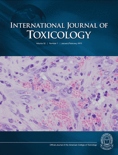
INTERNATIONAL JOURNAL OF TOXICOLOGY
Fostering Collaboration in Toxicology to Shape Future Discoveries.The International Journal of Toxicology, published by SAGE Publications Inc, serves as a cornerstone of scholarly research in the field of toxicology, with an established history dating back to 1982. This esteemed journal, ISSN 1091-5818 and E-ISSN 1092-874X, functions within the Q3 quartile in Toxicology, ranking 94 out of 133 in the Pharmacology, Toxicology and Pharmaceutics category per Scopus metrics, reflecting its commitment to advancing scientific understanding in this critical area. The journal not only aims to disseminate high-quality research but also encourages open access to vital studies, thus fostering collaboration and innovation among researchers, professionals, and students alike. With a focus on various aspects of toxicology, including but not limited to environmental, clinical, and molecular toxicology, the International Journal of Toxicology is dedicated to bridging gaps in toxicity research and promoting safe practices across numerous disciplines. As it converges towards 2024, the journal continues to play a vital role in shaping the discourse surrounding the implications of exposure to toxic substances in human health and the environment.
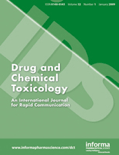
DRUG AND CHEMICAL TOXICOLOGY
Exploring the intersection of health and chemical science.Drug and Chemical Toxicology is a well-respected journal in the fields of toxicology, pharmacology, and public health, published by Taylor & Francis Ltd. Since its inception in 1978, this journal has diligently explored the effects and mechanisms of chemical exposures on health and the environment, fulfilling a crucial role in advancing scientific understanding and safeguarding public health. The journal is indexed across prestigious databases and features an impressive array of articles categorized within the Q2 and Q3 quartiles across various categories in 2023, reflecting its significance in Chemical Health and Safety as well as Environmental and Occupational Health disciplines. With an extensive reach and a focus on interdisciplinary research, Drug and Chemical Toxicology offers a rich repository of original research, reviews, and methodological advancements, catering to a diverse audience of researchers, professionals, and students dedicated to the betterment of safety and health standards. Although not an open-access publication, its articles are widely accessible to the academic community, ensuring that critical innovations and insights are shared for the greater good.

TOXICOLOGY AND APPLIED PHARMACOLOGY
Connecting Research to Real-World ApplicationsTOXICOLOGY AND APPLIED PHARMACOLOGY, published by Academic Press, Inc. Elsevier Science, stands as a leading journal in the domains of toxicology and pharmacology, with its establishment dating back to 1959. With an impact factor reflecting its academic rigor and relevance, this journal is classified in the Q2 quartile for both pharmacology and toxicology categories, underscoring its significance in the scientific community. It ranks #34 out of 133 in Toxicology and #95 out of 313 in Pharmacology according to Scopus, placing it within the 74th and 69th percentiles, respectively. The journal aims to disseminate quality research that drives advancements in understanding the interactions of drugs and toxic substances within biological systems. Researchers and professionals are invited to contribute and engage with a broad spectrum of articles that cover mechanistic studies, risk assessment, and innovative therapeutic strategies. Although the journal does not offer open access, it continues to be a crucial resource for those who seek to navigate the complex interface of drugs and their toxicological implications.
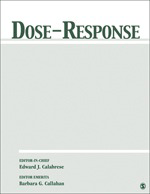
Dose-Response
Exploring the Nuances of Chemical Exposure and Public HealthWelcome to Dose-Response, a premier open-access journal published by SAGE Publications Inc., dedicated to advancing the understanding of dose-response relationships in chemical exposure, health, toxicology, and public health. Established in 2003, this journal has quickly become an invaluable resource for researchers and professionals in the fields of public health, environmental science, and toxicology, boasting a commendable impact factor and a notable ranking in multiple categories, including Q2 in Public Health and Environmental and Occupational Health. With its converged years stretching from 2008 to 2024, Dose-Response aims to publish high-quality articles that contribute to the evaluation of health risks and benefits, ensuring that essential research reaches a global audience. Its open-access model provides unrestricted access to groundbreaking studies, fostering collaborative efforts among scientists and practitioners to inform policy and improve public health outcomes.